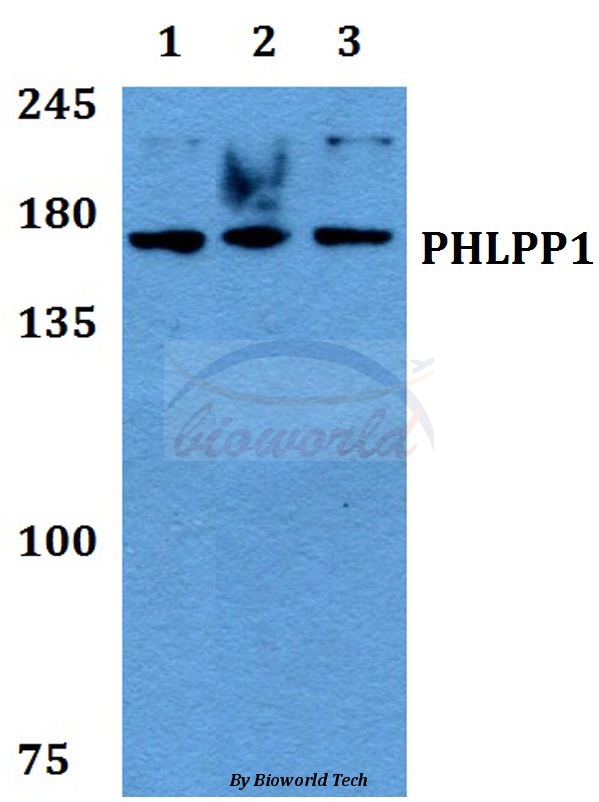Product Name :
PHLPP1 polyclonal antibody Background :
SCOP (Suprachiasmatic nucleus circadian oscillatory protein, PHLPP, PH domain and leucine rich repeat protein phosphatase, PLEKHE1) is a phosphatase that directly dephosphorylates Akt, promotes apoptosis, and suppresses tumor growth. Endogenous SCOP in human embryonic kidney cell lysates produces a major protein and minor protein. SCOP negatively regulates K-Ras signaling in membrane rafts and contributes to the regulation of the Ras-MAPK signaling pathway. Recombinant SCOP can dephosphorylate the hydrophobic motif of Akt1 (ser-473) in vitro, triggering apoptosis and suppressing tumor growth. SCOP levels appear lower in certain colon cancer and glioblastoma cell lines that show elevated Akt phosphorylation. Rat tissues that express SCOP include cerebrum, cerebellum, and testis. Product :
Rabbit IgG, 1mg/ml in PBS with 0.02% sodium azide, 50% glycerol, pH7.2 Storage&Stability :
Store at 4°C short term. Aliquot and store at -20°C long term. Avoid freeze-thaw cycles. Specificity :
PHLPP1 polyclonal antibody detects endogenous levels of PHLPP1 protein. Immunogen :
A synthetic peptide corresponding to residues in Human PHLPP1. Conjugate :
Unconjugated Modification :
Unmodification
PHLPP1 polyclonal antibody Background :
SCOP (Suprachiasmatic nucleus circadian oscillatory protein, PHLPP, PH domain and leucine rich repeat protein phosphatase, PLEKHE1) is a phosphatase that directly dephosphorylates Akt, promotes apoptosis, and suppresses tumor growth. Endogenous SCOP in human embryonic kidney cell lysates produces a major protein and minor protein. SCOP negatively regulates K-Ras signaling in membrane rafts and contributes to the regulation of the Ras-MAPK signaling pathway. Recombinant SCOP can dephosphorylate the hydrophobic motif of Akt1 (ser-473) in vitro, triggering apoptosis and suppressing tumor growth. SCOP levels appear lower in certain colon cancer and glioblastoma cell lines that show elevated Akt phosphorylation. Rat tissues that express SCOP include cerebrum, cerebellum, and testis. Product :
Rabbit IgG, 1mg/ml in PBS with 0.02% sodium azide, 50% glycerol, pH7.2 Storage&Stability :
Store at 4°C short term. Aliquot and store at -20°C long term. Avoid freeze-thaw cycles. Specificity :
PHLPP1 polyclonal antibody detects endogenous levels of PHLPP1 protein. Immunogen :
A synthetic peptide corresponding to residues in Human PHLPP1. Conjugate :
Unconjugated Modification :
Unmodification
-
 Western blot (WB) analysis of PHLPP1 polyclonal antibody at 1:500 dilution Lane1:HEK293T whole cell lysate Lane2:sp2/0 whole cell lysate Lane3:PC12 whole cell lysate
Western blot (WB) analysis of PHLPP1 polyclonal antibody at 1:500 dilution Lane1:HEK293T whole cell lysate Lane2:sp2/0 whole cell lysate Lane3:PC12 whole cell lysate
Bioworld Biotech only provide peptides for our antibodies and do not provide additional peptide customization services.
Price/Size :
USD 368/1mg/vial
Tips:
For phospho antibody, we provide phospho peptide(0.5mg) and non-phospho peptide(0.5mg).Describe :
Blocking peptides are peptides that bind specifically to the target antibody and block antibody binding. These peptide usually contains the epitope recognized by the antibody. Antibodies bound to the blocking peptide no longer bind to the epitope on the target protein. This mechanism is useful when non-specific binding is an issue, for example, in Western blotting (WB) and Immunohistochemistry (IHC). By comparing the staining from the blocked antibody versus the antibody alone, one can see which staining is specific; Specific binding will be absent from the western blot or IHC performed with the neutralized antibody.Formula:
Synthetic peptide was lyophilized with 100% acetonitrile and is supplied as a powder. Reconstitute with 0.1 ml DI water for a final concentration of 10 mg/ml.The purity is >90%,tested by HPLC and MS.
Storage:
The freeze-dried powder is more stable. For short time at 2-8°C. For long term storage store at -20°C.
Note :
This product is for research use only (RUO only). Not for use in diagnostic or therapeutic procedures.
 PHLPP1 polyclonal antibody
PHLPP1 polyclonal antibody  Datasheet
Datasheet COA
COA MSDS
MSDS SHIP
SHIP